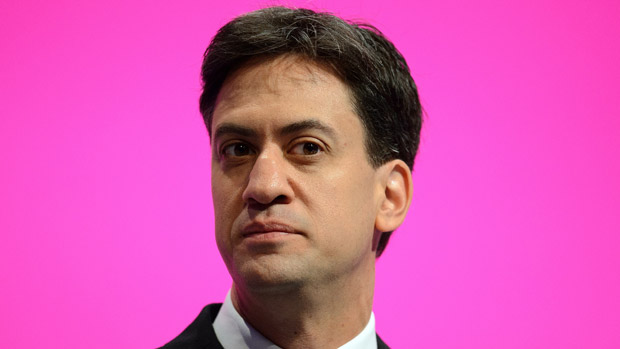Ed Miliband plans mansion and tobacco tax to save the NHS
Labour leader tells party conference his six big goals to transform how the United Kingdom is run

A free daily email with the biggest news stories of the day – and the best features from TheWeek.com
You are now subscribed
Your newsletter sign-up was successful
Labour leader Ed Miliband will today pledge to save the NHS and build a better Britain over the next decade if his party is voted into power next year.
In a speech to the Labour Party Conference in Manchester, Miliband will outline his plans to top up the health budget, which is expected to face a £30bn funding gap by 2020.
Proceeds from a mansion tax on homes worth more than £2m, as well as a new windfall tax on the profits of UK tobacco companies, will be put towards the NHS, reports The Guardian.
The Week
Escape your echo chamber. Get the facts behind the news, plus analysis from multiple perspectives.

Sign up for The Week's Free Newsletters
From our morning news briefing to a weekly Good News Newsletter, get the best of The Week delivered directly to your inbox.
From our morning news briefing to a weekly Good News Newsletter, get the best of The Week delivered directly to your inbox.
Funds from the mansion tax had initially been earmarked by Labour to fund a 10p starting rate of income tax, but this will now be funded by abolishing the marriage tax rate.
As well as restoring the NHS, the Labour leader has laid out five other big goals to:
- Halve the number of low-paid workers from five million to 2.5 million. This includes anyone who earns two-thirds of median earnings
- "Restore the dream of home ownership" by doubling the number of first-time buyers from the current 200,000 a year to 400,000
- Create one million more hi-tech green jobs
- Ensure as many school-leavers go into an apprenticeship as those who go to university
- Help working families share fairly in the UK's wealth
The Independent says Miliband's final Labour conference speech before next May's election is "designed to answer criticism that Labour has a raft of policies but no overarching vision".
Miliband will announce his plan to "raise people's sights", match the Conservatives' long-term economic plan and improve the prospects of young people.
A free daily email with the biggest news stories of the day – and the best features from TheWeek.com
"Our task is to restore people's faith in the future. But the way to do it is not to break up our country. It is to break with the old way of doing things, break with the past," he is expected to say later today in Manchester.
"I'm not talking about changing a policy, or simply a different programme. But something that is bigger: transforming the idea, the ethic, of how our country is run."
-
 The environmental cost of GLP-1s
The environmental cost of GLP-1sThe explainer Producing the drugs is a dirty process
-
 Greenland’s capital becomes ground zero for the country’s diplomatic straits
Greenland’s capital becomes ground zero for the country’s diplomatic straitsIN THE SPOTLIGHT A flurry of new consular activity in Nuuk shows how important Greenland has become to Europeans’ anxiety about American imperialism
-
 ‘This is something that happens all too often’
‘This is something that happens all too often’Instant Opinion Opinion, comment and editorials of the day
-
 How corrupt is the UK?
How corrupt is the UK?The Explainer Decline in standards ‘risks becoming a defining feature of our political culture’ as Britain falls to lowest ever score on global index
-
 Reforming the House of Lords
Reforming the House of LordsThe Explainer Keir Starmer’s government regards reform of the House of Lords as ‘long overdue and essential’
-
 How long can Keir Starmer last as Labour leader?
How long can Keir Starmer last as Labour leader?Today's Big Question Pathway to a coup ‘still unclear’ even as potential challengers begin manoeuvring into position
-
 The high street: Britain’s next political battleground?
The high street: Britain’s next political battleground?In the Spotlight Mass closure of shops and influx of organised crime are fuelling voter anger, and offer an opening for Reform UK
-
 Is a Reform-Tory pact becoming more likely?
Is a Reform-Tory pact becoming more likely?Today’s Big Question Nigel Farage’s party is ahead in the polls but still falls well short of a Commons majority, while Conservatives are still losing MPs to Reform
-
 The launch of Your Party: how it could work
The launch of Your Party: how it could workThe Explainer Despite landmark decisions made over the party’s makeup at their first conference, core frustrations are ‘likely to only intensify in the near-future’
-
 What does the fall in net migration mean for the UK?
What does the fall in net migration mean for the UK?Today’s Big Question With Labour and the Tories trying to ‘claim credit’ for lower figures, the ‘underlying picture is far less clear-cut’
-
 Will the public buy Rachel Reeves’s tax rises?
Will the public buy Rachel Reeves’s tax rises?Today’s Big Question The Chancellor refused to rule out tax increases in her televised address, and is set to reverse pledges made in the election manifesto